中国社交礼仪英语作文
- 格式:docx
- 大小:28.74 KB
- 文档页数:11
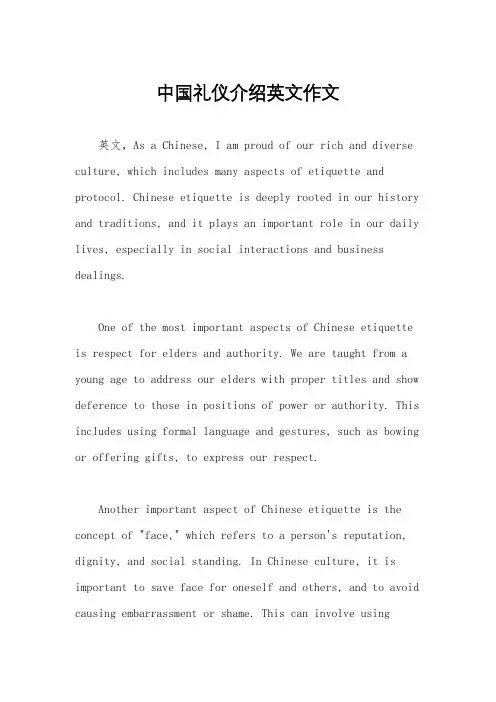
中国礼仪介绍英文作文英文,As a Chinese, I am proud of our rich and diverse culture, which includes many aspects of etiquette and protocol. Chinese etiquette is deeply rooted in our history and traditions, and it plays an important role in our daily lives, especially in social interactions and business dealings.One of the most important aspects of Chinese etiquette is respect for elders and authority. We are taught from a young age to address our elders with proper titles and show deference to those in positions of power or authority. This includes using formal language and gestures, such as bowing or offering gifts, to express our respect.Another important aspect of Chinese etiquette is the concept of "face," which refers to a person's reputation, dignity, and social standing. In Chinese culture, it is important to save face for oneself and others, and to avoid causing embarrassment or shame. This can involve usingindirect language or gestures to communicate, or avoiding certain topics or actions that may be considered impoliteor inappropriate.In addition, gift-giving is an important part of Chinese etiquette, particularly in business settings. It is customary to bring a small gift when visiting someone's home or office, and to offer gifts to business partners or clients as a sign of respect and goodwill. However, it is important to choose appropriate gifts and avoid giving anything that may be seen as too extravagant or inappropriate.Overall, Chinese etiquette is a complex and nuanced system that reflects our cultural values and traditions. By following these customs and showing respect for others, we can build strong relationships and foster mutual understanding.中文,作为一个中国人,我为我们丰富多彩的文化而感到自豪,其中包括许多礼仪和协议方面。
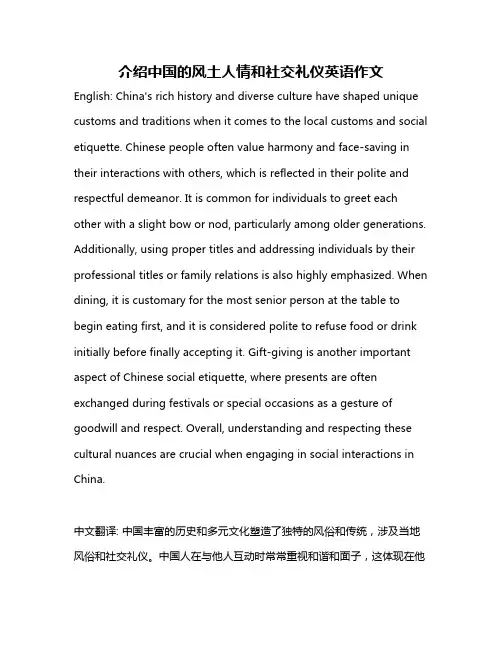
介绍中国的风土人情和社交礼仪英语作文English: China's rich history and diverse culture have shaped unique customs and traditions when it comes to the local customs and social etiquette. Chinese people often value harmony and face-saving in their interactions with others, which is reflected in their polite and respectful demeanor. It is common for individuals to greet each other with a slight bow or nod, particularly among older generations. Additionally, using proper titles and addressing individuals by their professional titles or family relations is also highly emphasized. When dining, it is customary for the most senior person at the table to begin eating first, and it is considered polite to refuse food or drink initially before finally accepting it. Gift-giving is another important aspect of Chinese social etiquette, where presents are often exchanged during festivals or special occasions as a gesture of goodwill and respect. Overall, understanding and respecting these cultural nuances are crucial when engaging in social interactions in China.中文翻译: 中国丰富的历史和多元文化塑造了独特的风俗和传统,涉及当地风俗和社交礼仪。
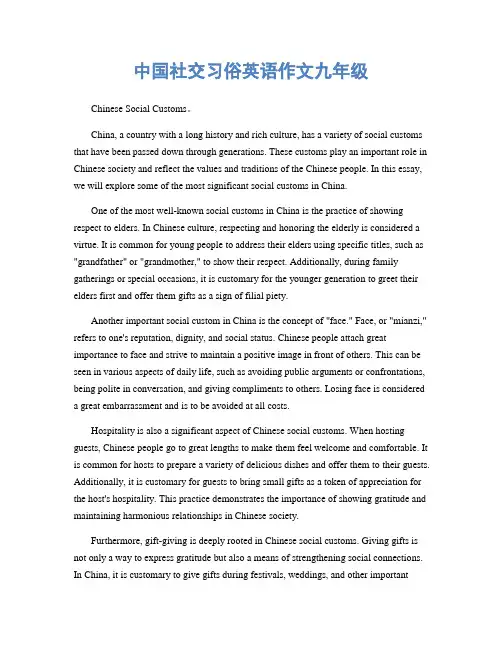
中国社交习俗英语作文九年级Chinese Social Customs。
China, a country with a long history and rich culture, has a variety of social customs that have been passed down through generations. These customs play an important role in Chinese society and reflect the values and traditions of the Chinese people. In this essay, we will explore some of the most significant social customs in China.One of the most well-known social customs in China is the practice of showing respect to elders. In Chinese culture, respecting and honoring the elderly is considered a virtue. It is common for young people to address their elders using specific titles, such as "grandfather" or "grandmother," to show their respect. Additionally, during family gatherings or special occasions, it is customary for the younger generation to greet their elders first and offer them gifts as a sign of filial piety.Another important social custom in China is the concept of "face." Face, or "mianzi," refers to one's reputation, dignity, and social status. Chinese people attach great importance to face and strive to maintain a positive image in front of others. This can be seen in various aspects of daily life, such as avoiding public arguments or confrontations, being polite in conversation, and giving compliments to others. Losing face is considered a great embarrassment and is to be avoided at all costs.Hospitality is also a significant aspect of Chinese social customs. When hosting guests, Chinese people go to great lengths to make them feel welcome and comfortable. It is common for hosts to prepare a variety of delicious dishes and offer them to their guests. Additionally, it is customary for guests to bring small gifts as a token of appreciation for the host's hospitality. This practice demonstrates the importance of showing gratitude and maintaining harmonious relationships in Chinese society.Furthermore, gift-giving is deeply rooted in Chinese social customs. Giving gifts is not only a way to express gratitude but also a means of strengthening social connections. In China, it is customary to give gifts during festivals, weddings, and other importantoccasions. When choosing a gift, it is important to consider the recipient's preferences and avoid items that may be seen as unlucky, such as clocks or sharp objects. The act of giving and receiving gifts is seen as a way to show care and build stronger relationships.Lastly, the concept of "guanxi" is an essential part of Chinese social customs. Guanxi refers to the network of relationships and connections that one has. Building and maintaining guanxi is crucial for personal and professional success in China. It involves cultivating personal relationships, exchanging favors, and mutual assistance. Chinese people often rely on their guanxi to access resources, opportunities, and support when needed.In conclusion, Chinese social customs are deeply rooted in the country's history and culture. From respecting elders to maintaining face, practicing hospitality, giving gifts, and building guanxi, these customs reflect the values and traditions of the Chinese people. Understanding and respecting these customs are essential for anyone who wants to engage with Chinese society and build meaningful relationships. By embracing these customs, one can gain a deeper appreciation for Chinese culture and foster cross-cultural understanding.。
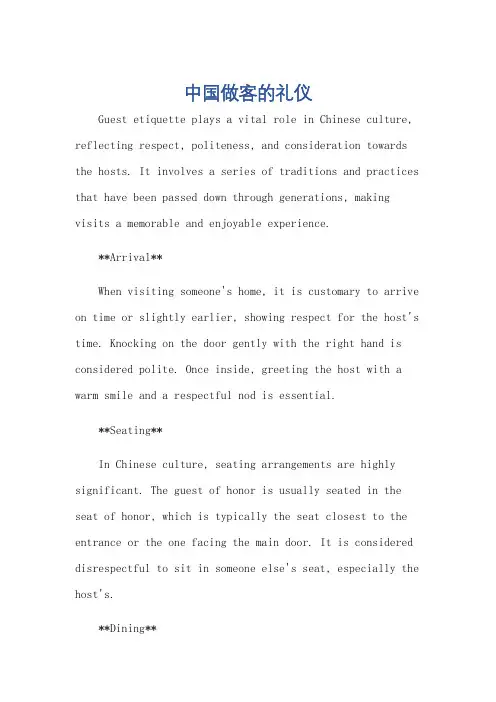
中国做客的礼仪Guest etiquette plays a vital role in Chinese culture, reflecting respect, politeness, and consideration towards the hosts. It involves a series of traditions and practices that have been passed down through generations, making visits a memorable and enjoyable experience.**Arrival**When visiting someone's home, it is customary to arrive on time or slightly earlier, showing respect for the host's time. Knocking on the door gently with the right hand is considered polite. Once inside, greeting the host with a warm smile and a respectful nod is essential.**Seating**In Chinese culture, seating arrangements are highly significant. The guest of honor is usually seated in the seat of honor, which is typically the seat closest to the entrance or the one facing the main door. It is considered disrespectful to sit in someone else's seat, especially the host's.**Dining**During meals, it is customary for the host to serve the dishes and offer them to the guests first. Guests should accept the offer gracefully and show appreciation by making positive comments about the food. It is also considered polite to use chopsticks properly, avoid slurping, and chew with the mouth closed.**Conversation**Conversation during visits should be light and pleasant, avoiding topics such as politics, religion, or personal controversies. It is polite to ask about the host's family, work, or recent activities and show interest in their responses.**Leaving**When it's time to leave, it is customary to express gratitude to the host for their hospitality and invite them to visit in return. Rising from the seat gracefully, saying goodbye, and thanking the host again before leaving is considered polite.**Gift-Giving**In Chinese culture, gift-giving is a common practice when visiting someone's home. It is essential to choose agift that is appropriate and meaningful, such as fruits, candies, or tea. Wrapping the gift neatly and presenting it with both hands is considered respectful.In conclusion, guest etiquette in Chinese culture is a crucial aspect of social interactions. Following these traditions and practices helps create a warm and welcoming atmosphere, strengthening the bonds of friendship and respect between hosts and guests.**中国做客的礼仪**在中国文化中,做客的礼仪占据着举足轻重的地位,它体现了对主人的尊重、礼貌和体谅。
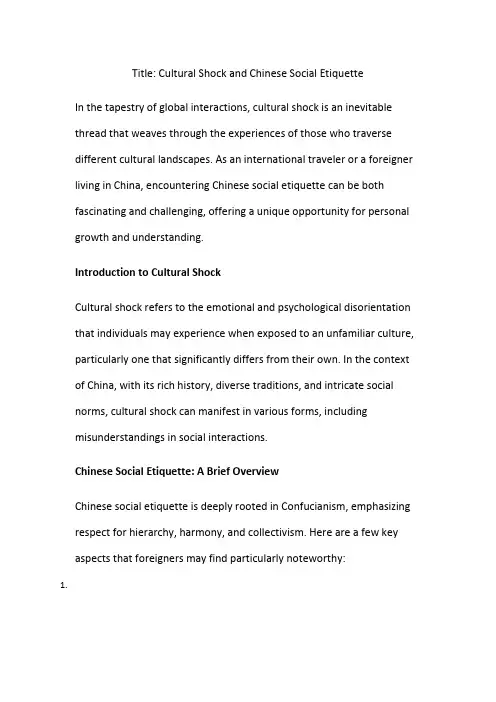
Title: Cultural Shock and Chinese Social Etiquette In the tapestry of global interactions, cultural shock is an inevitablethread that weaves through the experiences of those who traversedifferent cultural landscapes. As an international traveler or a foreigner living in China, encountering Chinese social etiquette can be bothfascinating and challenging, offering a unique opportunity for personal growth and understanding.Introduction to Cultural ShockCultural shock refers to the emotional and psychological disorientation that individuals may experience when exposed to an unfamiliar culture, particularly one that significantly differs from their own. In the context of China, with its rich history, diverse traditions, and intricate social norms, cultural shock can manifest in various forms, includingmisunderstandings in social interactions.Chinese Social Etiquette: A Brief OverviewChinese social etiquette is deeply rooted in Confucianism, emphasizing respect for hierarchy, harmony, and collectivism. Here are a few key aspects that foreigners may find particularly noteworthy:1.Greetings and Formalities: In China, greetings are often accompanied by handshakes or, more traditionally, bowing slightly. The use of titles or honorifics (such as "Mr.", "Mrs.", or professional titles) is consideredpolite and respectful. Direct eye contact is essential, but excessivestaring is avoided.2.3.Hierarchy and Respect: Chinese society values hierarchy highly, and this is reflected in social interactions. Younger individuals are expected to show respect to elders, and subordinates to superiors. Addressingsomeone by their name or without proper titles can be perceived asdisrespectful.4.5.Dining Customs: Chinese dining etiquette is elaborate and involves many rituals. Seating arrangements are significant, with the most important guests seated at the head of the table. Using chopsticks correctly and participating in toasts are important aspects of the dining experience.It's customary to offer food to others and to accept it politely, even if one is not hungry.6.7.Gift Giving: Gift-giving is a common practice in Chinese culture, often done to express gratitude, respect, or to strengthen relationships. The choice of gift is important, and certain items (like clocks or shoes) are avoided due to their negative connotations. Gifts are usually presented with both hands and accepted with gratitude.8.9.Personal Space: Compared to some Western cultures, Chinese people tend to have a more relaxed attitude towards personal space. Touching, especially among friends and family, is more common. However, this can be a source of discomfort for foreigners accustomed to greater physical distance.10.Navigating Cultural Shock and Embracing Chinese EtiquetteTo navigate cultural shock and embrace Chinese social etiquette, it'sessential to maintain an open mind and a willingness to learn. Here are some tips:•Observe and Ask: Pay attention to how locals interact and ask questions politely when unsure. Showing genuine interest and curiosity fosters respect and understanding.•Adapt and Respect: While it's natural to maintain some aspects of one's own culture, adapting to local customs and showing respect for Chinese etiquette will enhance your experience.•Patience and Humility: Cultural differences can lead to misunderstandings, but patience and humility in resolving them will go a long way.•Seek Support: Connecting with other foreigners or locals who can offer guidance and support can be invaluable during times of cultural adjustment.In conclusion, cultural shock is a natural part of engaging with China's rich social etiquette. By embracing this experience with an open heart and a willingness to learn, foreigners can not only overcome thechallenges it presents but also deepen their appreciation for the beauty and complexity of Chinese culture.。
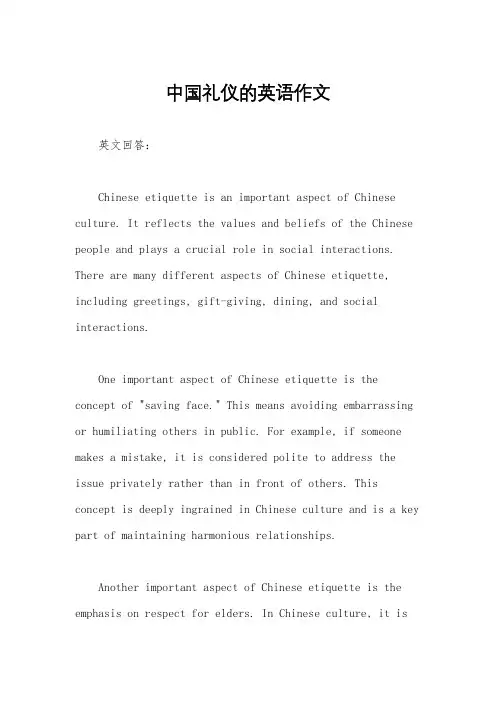
中国礼仪的英语作文英文回答:Chinese etiquette is an important aspect of Chinese culture. It reflects the values and beliefs of the Chinese people and plays a crucial role in social interactions. There are many different aspects of Chinese etiquette, including greetings, gift-giving, dining, and social interactions.One important aspect of Chinese etiquette is the concept of "saving face." This means avoiding embarrassing or humiliating others in public. For example, if someone makes a mistake, it is considered polite to address the issue privately rather than in front of others. This concept is deeply ingrained in Chinese culture and is a key part of maintaining harmonious relationships.Another important aspect of Chinese etiquette is the emphasis on respect for elders. In Chinese culture, it iscustomary to address elders with formal titles and to show deference to their opinions and decisions. For example, when dining with elders, it is polite to let them choose their seats first and to serve them food before serving oneself.In addition, gift-giving is an important part of Chinese etiquette. When giving a gift, it is important to present it with both hands as a sign of respect. Also, the recipient may initially refuse the gift out of politeness, so it is customary to offer it again.Furthermore, dining etiquette is also significant in Chinese culture. When dining with others, it is important to wait for the host to start eating before beginning the meal. It is also polite to use chopsticks properly and to avoid sticking them upright in a bowl of rice, as this is reminiscent of a funeral ritual.中文回答:中国礼仪是中国文化的重要组成部分。
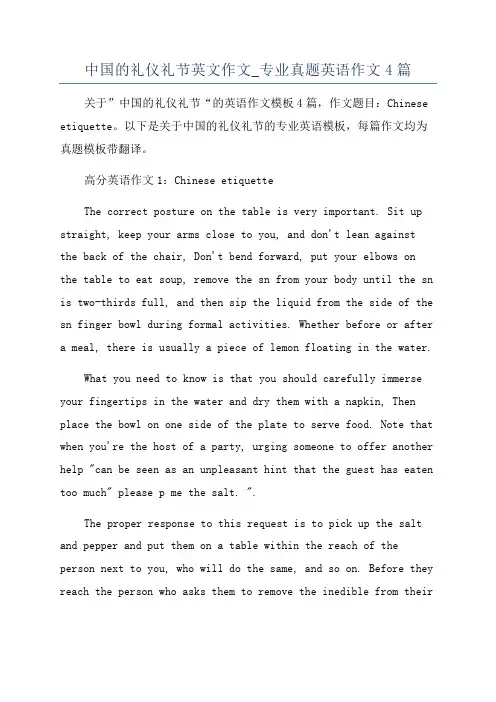
中国的礼仪礼节英文作文_专业真题英语作文4篇关于”中国的礼仪礼节“的英语作文模板4篇,作文题目:Chinese etiquette。
以下是关于中国的礼仪礼节的专业英语模板,每篇作文均为真题模板带翻译。
高分英语作文1:Chinese etiquetteThe correct posture on the table is very important. Sit up straight, keep your arms close to you, and don't lean against the back of the chair, Don't bend forward, put your elbows on the table to eat soup, remove the sn from your body until the sn is two-thirds full, and then sip the liquid from the side of the sn finger bowl during formal activities. Whether before or after a meal, there is usually a piece of lemon floating in the water.What you need to know is that you should carefully immerse your fingertips in the water and dry them with a napkin, Then place the bowl on one side of the plate to serve food. Note that when you're the host of a party, urging someone to offer another help "can be seen as an unpleasant hint that the guest has eaten too much" please p me the salt. ".The proper response to this request is to pick up the salt and pepper and put them on a table within the reach of the person next to you, who will do the same, and so on. Before they reach the person who asks them to remove the inedible from theirmouth, the general rule of removing food from the mouth is that the food should flow out in the same way.中文翻译:餐桌小贴士开始有两种常见的方法来决定如何在小型活动中开始,通常等到餐桌上的每个人都收到了一份食物,而女主人已经开始吃东西,这是很常见的。
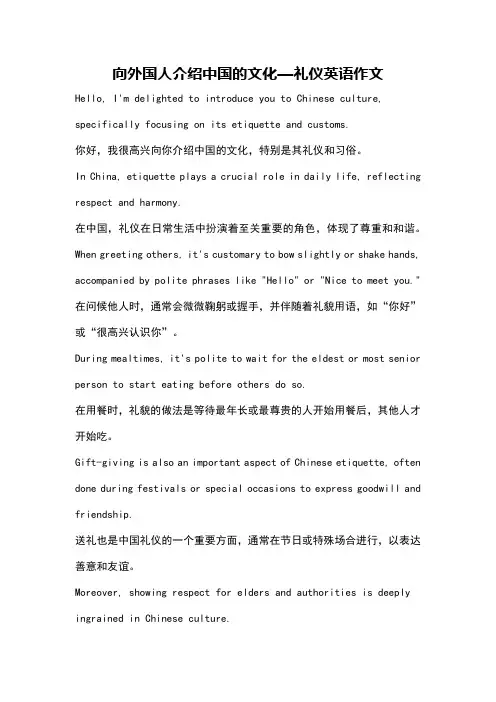
向外国人介绍中国的文化—礼仪英语作文Hello, I'm delighted to introduce you to Chinese culture, specifically focusing on its etiquette and customs.你好,我很高兴向你介绍中国的文化,特别是其礼仪和习俗。
In China, etiquette plays a crucial role in daily life, reflecting respect and harmony.在中国,礼仪在日常生活中扮演着至关重要的角色,体现了尊重和和谐。
When greeting others, it's customary to bow slightly or shake hands, accompanied by polite phrases like "Hello" or "Nice to meet you."在问候他人时,通常会微微鞠躬或握手,并伴随着礼貌用语,如“你好”或“很高兴认识你”。
During mealtimes, it's polite to wait for the eldest or most senior person to start eating before others do so.在用餐时,礼貌的做法是等待最年长或最尊贵的人开始用餐后,其他人才开始吃。
Gift-giving is also an important aspect of Chinese etiquette, often done during festivals or special occasions to express goodwill and friendship.送礼也是中国礼仪的一个重要方面,通常在节日或特殊场合进行,以表达善意和友谊。
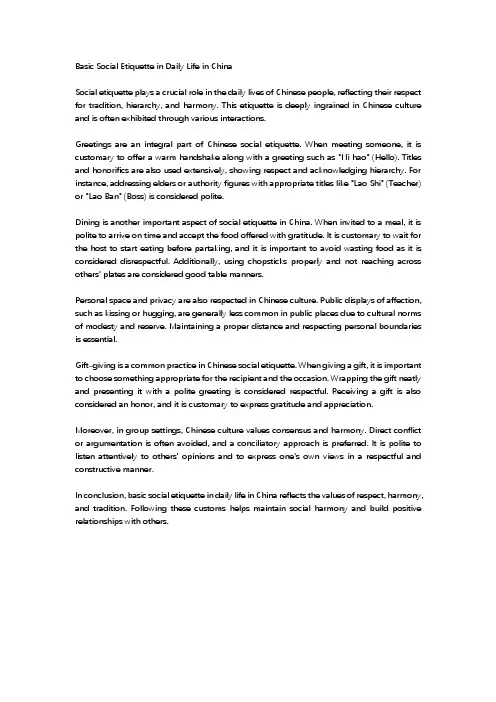
Basic Social Etiquette in Daily Life in ChinaSocial etiquette plays a crucial role in the daily lives of Chinese people, reflecting their respect for tradition, hierarchy, and harmony. This etiquette is deeply ingrained in Chinese culture and is often exhibited through various interactions.Greetings are an integral part of Chinese social etiquette. When meeting someone, it is customary to offer a warm handshake along with a greeting such as "Ni hao" (Hello). Titles and honorifics are also used extensively, showing respect and acknowledging hierarchy. For instance, addressing elders or authority figures with appropriate titles like "Lao Shi" (Teacher) or "Lao Ban" (Boss) is considered polite.Dining is another important aspect of social etiquette in China. When invited to a meal, it is polite to arrive on time and accept the food offered with gratitude. It is customary to wait for the host to start eating before partaking, and it is important to avoid wasting food as it is considered disrespectful. Additionally, using chopsticks properly and not reaching across others' plates are considered good table manners.Personal space and privacy are also respected in Chinese culture. Public displays of affection, such as kissing or hugging, are generally less common in public places due to cultural norms of modesty and reserve. Maintaining a proper distance and respecting personal boundaries is essential.Gift-giving is a common practice in Chinese social etiquette. When giving a gift, it is important to choose something appropriate for the recipient and the occasion. Wrapping the gift neatly and presenting it with a polite greeting is considered respectful. Receiving a gift is also considered an honor, and it is customary to express gratitude and appreciation.Moreover, in group settings, Chinese culture values consensus and harmony. Direct conflict or argumentation is often avoided, and a conciliatory approach is preferred. It is polite to listen attentively to others' opinions and to express one's own views in a respectful and constructive manner.In conclusion, basic social etiquette in daily life in China reflects the values of respect, harmony, and tradition. Following these customs helps maintain social harmony and build positive relationships with others.。
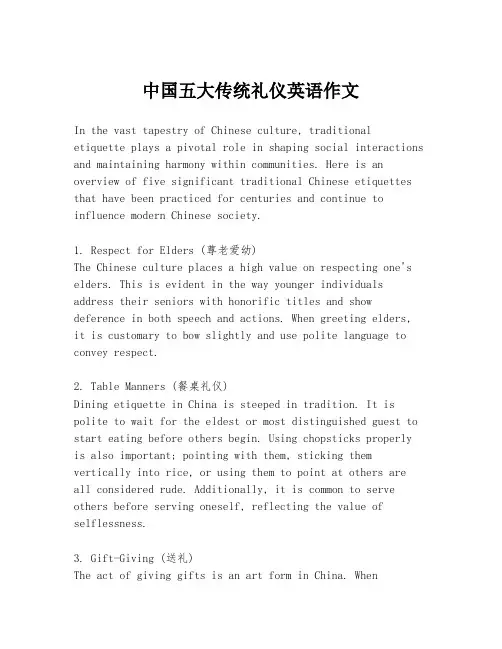
中国五大传统礼仪英语作文In the vast tapestry of Chinese culture, traditionaletiquette plays a pivotal role in shaping social interactions and maintaining harmony within communities. Here is an overview of five significant traditional Chinese etiquettes that have been practiced for centuries and continue to influence modern Chinese society.1. Respect for Elders (尊老爱幼)The Chinese culture places a high value on respecting one's elders. This is evident in the way younger individuals address their seniors with honorific titles and show deference in both speech and actions. When greeting elders, it is customary to bow slightly and use polite language to convey respect.2. Table Manners (餐桌礼仪)Dining etiquette in China is steeped in tradition. It is polite to wait for the eldest or most distinguished guest to start eating before others begin. Using chopsticks properly is also important; pointing with them, sticking themvertically into rice, or using them to point at others areall considered rude. Additionally, it is common to serve others before serving oneself, reflecting the value of selflessness.3. Gift-Giving (送礼)The act of giving gifts is an art form in China. Whenpresenting a gift, it is often done with both hands to show respect. Red envelopes containing money are a traditionalgift during festivals and special occasions. It is importantto avoid giving gifts that are white or have the number four, as these are associated with funerals and bad luck.4. Hospitality (待客之道)Chinese hospitality is renowned for its warmth and generosity. When hosting guests, it is customary to provide them with tea and refreshments. The host often takes the initiative to ensure that guests' cups are never empty, and it isconsidered impolite for guests to refuse food or drinkoffered by the host.5. Business Etiquette (商务礼仪)In the business context, Chinese etiquette emphasizes the importance of building relationships before conducting business. Exchanging business cards is a formal process where one's card is presented with both hands, and the recipient is expected to study the card carefully before putting it away. Punctuality is also highly valued, and meetings often begin with a round of introductions and small talk to establish rapport.These traditional etiquettes not only reflect the depth of Chinese culture but also serve as a guide for navigatingsocial and professional situations with grace and respect. As China continues to engage with the global community, understanding these customs can greatly enhance cross-cultural communication and foster mutual respect.。
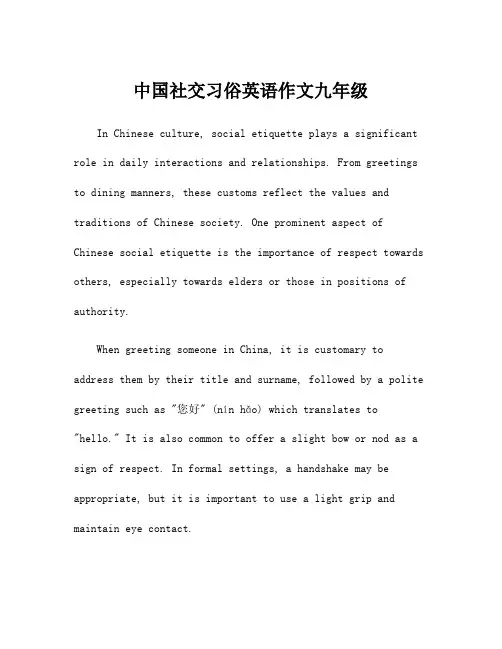
中国社交习俗英语作文九年级In Chinese culture, social etiquette plays a significant role in daily interactions and relationships. From greetings to dining manners, these customs reflect the values and traditions of Chinese society. One prominent aspect of Chinese social etiquette is the importance of respect towards others, especially towards elders or those in positions of authority.When greeting someone in China, it is customary to address them by their title and surname, followed by a polite greeting such as "您好" (nín hǎo) which translates to "hello." It is also common to offer a slight bow or nod as a sign of respect. In formal settings, a handshake may be appropriate, but it is important to use a light grip and maintain eye contact.During meals, there are several customs that must be observed. It is considered polite to let the eldest or most senior person at the table start eating first, as a sign of deference. When serving others, it is important to use both hands and offer dishes from the left side. It is also customary to wait until the host begins eating beforestarting your own meal.Another important aspect of Chinese social etiquette is the concept of "saving face." This means avoiding causing embarrassment or shame to others, especially in public settings. Criticizing or correcting someone in front of others is considered disrespectful and should be avoided.In Chinese social settings, gift-giving is a common practice that is meant to express gratitude and strengthen relationships. When presenting a gift, it is important to use both hands and avoid wrapping it in white or black, as thesecolors are associated with funerals. It is also customary to decline a gift or offer multiple times before accepting it.Overall, Chinese social etiquette is rooted in the values of respect, harmony, and humility. By observing these customs, individuals can build positive relationships and demonstrate their understanding and appreciation of Chinese culture.。
中国人的社交英语作文中国人的社交英语作文在学习、工作或生活中,大家都有写的经历,对作文很是熟悉吧,作文可分为小学作文、中学作文、大学作文(论文)。
怎么写作文才能避免踩雷呢?下面是小编收集整理的中国人的社交英语作文,希望对大家有所帮助。
When you ask a foreign what’s his impression about Chinese, he will say Chinese people are friendly and kind, but if you ask his impression about Chinese people when they are meeting in social occasion, he will answer you with the drink. It is a tradition for Chinese people that when they invite friends, they must prepare a lot of wine, the guests need to be drunk, because it means the hosts do a good job on treating their friends. Wine culture in China is very popular, it reflects on the business communication, too. When people need to deal with the business, they like to book a table in the hotel, and talk about the business work while they are having dinner. The inevitable thing is to drink, the boss like to watch the young employees to drink, when the boss is happy, the business is done. Chinese social communication is not in the best way, but there is no way to change.。
介绍中国的风土人情和社交礼仪英语作文China is a country with rich cultural traditions and social etiquette. The Chinese people are known for their hospitality, politeness, and respect for others. In Chinese culture, relationships and social harmony are highly valued, and this is reflected in their social interactions and customs.In China, it is common for people to greet each otherwith a handshake or a slight bow. When meeting someone for the first time, it is customary to address them by theirtitle and last name, followed by their professional titleor honorific. For example, Mr. Zhang would be addressed as Zhang Xian Sheng (张先生), and a professor would be addressed as Jiao Shou (教授).When dining with others, there are certain etiquettesthat should be observed. It is polite to wait for the hostto start eating before you begin, and it is considered rude to leave any food on your plate. Additionally, it is customary to offer a toast to your dining companions before drinking.In terms of social relationships, the Chinese place a strong emphasis on the concept of "guanxi" (关系), which refers to the networks and relationships that people build over time. Building and maintaining good guanxi is crucial in Chinese society, as it can lead to opportunities and favors in the future.In Chinese culture, respecting elders and showing deference to those in authority is highly valued. It is important to address older individuals with respect and to listen to their advice and wisdom.Overall, the Chinese people place a high value on social harmony, respect for others, and maintaining good relationships. These cultural values and social etiquettes are deeply ingrained in Chinese society and play a significant role in shaping the interactions and relationships of the people.中国是一个拥有丰富文化传统和社交礼仪的国家。
介绍中国人日常交往礼仪的英语作文Here is an English essay on the topic of Chinese daily social etiquette and customs, with the content exceeding 1000 words as requested. The essay is written entirely in English without any additional punctuation marks in the main body.Chinese Daily Social Etiquette and CustomsChinese culture is renowned for its rich history, deep-rooted traditions, and intricate social etiquette. One of the defining aspects of Chinese society is the importance placed on interpersonal relationships and the observance of proper etiquette in daily interactions. This essay aims to provide an in-depth exploration of the various customs and protocols that govern Chinese social interactions, offering insights into the nuances and significance of these practices.At the heart of Chinese social etiquette lies the concept of "mianzi," or face. The preservation and enhancement of one's own face, as well as the face of others, is a fundamental principle that permeates all aspects of Chinese social interactions. This emphasis on face-saving is evident in the way Chinese people greet each other, engage inconversation, and navigate social hierarchies.The greeting ritual in Chinese culture is a prime example of the importance placed on face. When meeting someone, it is customary to greet them with a slight bow or nod of the head, accompanied by a verbal greeting such as "Ni hao" (Hello) or "Zao shang hao" (Good morning). The depth of the bow and the tone of the greeting often convey the level of respect and deference the speaker has for the person they are addressing. Elders, superiors, and respected individuals are typically greeted with a deeper bow and a more formal tone, while casual greetings are reserved for friends and peers.Another crucial aspect of Chinese social etiquette is the art of conversation. Chinese people place a high value on maintaining harmonious relationships, and this is reflected in the way they engage in dialogue. Directness and confrontation are often avoided, as they are seen as potentially damaging to one's own or the other person's face. Instead, Chinese conversations tend to be more indirect, with a focus on building rapport and finding common ground. Subtle cues, such as body language and tone of voice, play a significant role in conveying meaning and intent.The concept of "guanxi," or personal connections and relationships, is another integral component of Chinese social etiquette. In Chinese culture, the strength and quality of one's guanxi network can greatlyinfluence one's social and professional standing. Building and maintaining strong guanxi is achieved through a variety of means, such as gift-giving, hosting and attending social events, and engaging in reciprocal favors. The exchange of gifts, in particular, is a deeply symbolic act that signifies respect, appreciation, and the desire to cultivate a lasting relationship.Hierarchy and seniority also play a crucial role in Chinese social etiquette. Respect for elders and those in positions of authority is deeply ingrained in Chinese culture. Younger individuals are expected to show deference to their seniors, both in terms of speech and behavior. This is evident in the use of honorifics and titles when addressing others, as well as in the way seating arrangements and serving orders are organized during social gatherings.Furthermore, Chinese social etiquette extends to the realm of dining and hospitality. Mealtimes are seen as opportunities to strengthen social bonds and display one's hospitality. Hosts are expected to ensure that their guests are well-fed and comfortable, often going to great lengths to prepare elaborate dishes and ensure that the dining experience is enjoyable. Guests, in turn, are expected to express their gratitude and appreciation for the host's efforts.The observance of Chinese social etiquette is not limited to personal interactions but also extends to public spaces and professionalsettings. In public, Chinese people are generally expected to maintain a sense of order and decorum, with behaviors such as queue-jumping and loud public displays frowned upon. In the workplace, Chinese etiquette emphasizes respect for authority, punctuality, and the preservation of harmonious relationships among colleagues.It is important to note that while these customs and protocols are widely observed in Chinese society, there can be regional variations and generational differences. As China continues to modernize and interact with the global community, some traditional etiquette practices may evolve or adapt to changing social dynamics.In conclusion, Chinese social etiquette is a complex and multifaceted aspect of the country's rich cultural heritage. From the importance of face-saving and guanxi to the observance of hierarchy and dining customs, these practices reflect the deep-rooted values and social norms that shape the fabric of Chinese society. Understanding and respecting these customs can greatly enhance one's ability to navigate and engage effectively within the Chinese cultural landscape.。
中国人的见面礼仪英文作文英文:Meeting etiquette is an important aspect of Chinese culture. When meeting someone for the first time, it is customary to greet them with a bow or a handshake. In more formal situations, such as business meetings, it is commonto exchange business cards. It is important to take thetime to read the card and show interest in the person's name and title.中文:见面礼仪是中国文化中的重要方面。
当第一次见面时,习惯上要以鞠躬或握手的方式问候对方。
在更正式的场合,如商务会议中,交换名片是很常见的。
重要的是要花时间阅读名片,并对对方的姓名和职务表现出兴趣。
In addition, it is polite to address someone with their professional title or surname and formal title, such as"Mr." or "Madam." It is also important to use appropriate language and avoid slang or informal language.此外,礼貌地称呼对方的职业头衔或姓氏和正式头衔,如“先生”或“女士”是很有礼貌的。
同时,使用适当的语言并避免使用俚语或非正式语言也是很重要的。
When offering a gift, it is customary to wrap it in red paper or a red envelope, as red symbolizes good luck and prosperity. It is also important to present the gift with both hands and to express gratitude for the opportunity to meet.当赠送礼物时,习惯上要用红色的纸或红色的信封包装,因为红色象征着好运和繁荣。
Title: The Etiquette of Daily Interactions in Chinese CultureIn the vast and diverse tapestry of Chinese culture, etiquette plays a pivotal role in shaping social interactions and fostering harmony within communities. Rooted deeply in tradition and respect for hierarchy, Chinese daily etiquette embodies a delicate balance of politeness, humility, and respect for others. This essay aims to introduce some of the fundamental principles and practices that guide Chinese people in their daily encounters.Greetings and SalutationsUpon meeting someone, Chinese people often exchange greetings that reflect the time of day or the occasion. Common greetings include "你好(nǐ hǎo)," meaning "hello" or "hi," which is appropriate for most casual encounters. For more formal occasions or when addressing elders, one might use "您好(nín hǎo)," which conveys a slightly higher level of respect. Bowing slightly, especially for elders or in traditional settings, is also a sign of respect.Using Titles and Names AppropriatelyIn Chinese culture, it is important to address people using appropriate titles or names. Family members are typically referred to by their familial titles, such as "爸爸(bàba)" for father, "妈妈(māma)" for mother, and so on. In professional or social settings, using someone's surname prefixed with a respectful term like "先生(xiānsheng)" for men or "女士(nǚshì)" for women is common. Close friends or colleagues may use first names, but this often depends on the level of familiarity and the context. Dining EtiquetteChinese dining etiquette is rich and nuanced, reflecting the importance of mealtime as a social occasion. When seated at a table, the most senior or honored guest is typically seated at the head of the table facing the door. Utensils are used in a specific order, and it is considered impolite to point your chopsticks at others or stick them vertically into your rice (resembling incense sticks used in funerals). Sharing food from communal plates is common, but one should use their own utensils to transfer food to their plate. Chewing with your mouth closed and refraining from talking with food in your mouth are also essential dining manners.Gift GivingGift-giving is an integral part of Chinese social customs, often done to express gratitude, celebrate special occasions, or strengthen relationships. When giving a gift, it is customary to wrap it neatly and present it with both hands to show respect. Gifts should be chosen thoughtfully, avoiding items that may be considered inappropriate or superstitious. Receiving a gift, one should express gratitude and, in some cases, offer a small gift in return known as a "return gift" or "hui li."Respect for Elders and AuthorityRespect for elders and those in positions of authority is deeply ingrained in Chinese culture. This is evident in daily interactions, where younger individuals often defer to elders in conversations and decision-making processes. Standing or sitting in a posture that conveys respect, listening attentively, and refraining from interrupting are all ways to demonstrate one's deference.In conclusion, Chinese daily etiquette is a complex web of customs and practices that reflect the values of respect, humility, and harmony. By understanding and adhering to these principles, individuals can navigate social interactions smoothly and foster positive relationships within Chinese society.。
1 11 竭诚为您提供优质文档/双击可除
中国社交礼仪英语作文
篇一:中西文化在社交礼仪中的差异英文版 中西文化在社交礼仪有何差异要英文版的英文版 10 [标签:社交礼仪,中西,社交]雨后气息回答:3人气:1540解决时间:20xx-09-2022:35 检举 中西方礼仪文化差异(二)英文
itisalsoappropriatetoaskhowtheyprefertobeaddressed.childrenshould
alwaysaddressadultsintheformalfashion,usingtheirtitleandlastname.
anotherdifferenceisabouttheformofaddressing.Fromthe
2 11 viewpointofsociolinguistics,formsofaddressingcanserveasanindicationoftherelationshipofpowerandsolidarityinthesociety.incallingtheirsuperiorsorelders,the
chineseareaccustomedtothenoeciprocalorasymmetricaladdressing,inotherwords.theyuse“title+surname”toaddresstheirsuperiororeldersrather
thancallthemsurnames,whilethesuperiororelderscalltheaddresserstheir
names.thechinesetendtoabidebythepoliteprincipleofdepreciatingoneself
andrespectingotherstoshowappropriaterespectstowardsthepersonsbeingaddressed,otherwise,theaddressermaybeconsideredasillmannered,illeducatedorrude.butinenglishspeakingcountries,peoplehaveatendencytofollowthereciprocalorsymmetricaladdressing.althoughtheyaredifferentinageand
status,theycancalltheotherdirectly,namely,theirname
3 11 s,evenfirstnames
exceptwhentheycallthedoctors,notarousingoffencebetweenthem,butdemonstratingthesenseofintimacyandtheconceptionof”everyoneiscreatedequal” .chinesepeoplefeelunnaturaladdressingawesternerbyhisgivenname,feelingthatitindicatestooclosearelationship,andwesterners,ontheotherhand,
mayfeelthatifachineseinsistsonusinghissurname,itindicatesanunwillingnesstobefriendlyandmaintainsagapbetweenthem.sotheuseofformslike”missmary”or“mr.smith”maybeachineseformsofcompromise.withmissmary,theuseofthegivennameindicates
friendliness,buttheadditionofthetitleindicatestherespecttheyfeeltheyoughttoshow.andwithsmith,the
lackofatitleindicatesfriendliness,buttheuseofthesurnamepreventsifsoundingtoointimate.however,bothaddressingusedbythechinesesoundverystrangeanduncomfortabletothewesterner.
4 11 3.complimentsandResponsetocomplimentistopraisetheaddressee’svirtues,ability,behavior,appearance,clothing,personalityand
belongs.appropriatecomplimentscanserveaseffectivesupplementarymeansininter-personalcommunication.westernandchinesecultureareatpolaroppositesaboutcompliment.anwesternhostess,ifsheiscomplimentedforhercookingskill,islikelytosay,”oh,iamsogladthatyou likedit.icookitespeciallyforyou.”notsoisachinesehostess,whowill insteadapologizeforgivingyou“nothing”.theywillsay“随便作几个菜,不好吃 。”iftranslatethisintoenglish“ijustmadesomedishescasuallyandtheyarenotverytasty.perhapstheforeignerwillthinkwhyyouinvitemetoyoufamilyandhavetheuntastyfood.youarentrespectme.theenglish-speakingpeople
aremoreactivetopraiseothersandtobepraisethanchinese
5 11 people.Forexample,theamericansare“straightforwardness”,thechinesetakepridein“modesty”.thatmodestyhasleftmanyachinesehungryatanamericanstable,forchinesepolitenesscallsforthreerefusalsbeforeoneacceptsanofferandtheamericanshoststake”no”tomean“no”,whetheritisthefirst,secondor thirdtime.stillbiggerdifferencesexistinpeople’sattitudetowardscompliments,i.e.,intheresponsetocompliments.chinesearetendtoeffacethemselvesinwordsorrefuseit,althoughtheydofeelcomfortableaboutthecompliments .somanywesternerssimplyfeelpuzzledorevenupsetwhentheirchinesefriendsrefusedtheircompliments.thechinesepeoplearenotintendingtobemodestwiththesacrificeoffriendshipinsodoing,butitisratherduetothetraditionalchinesephilosophy,thatofmodesty.thechinesepeople
regardmodestyasamostvaluablevirtue,sotheyseldomagreetothecomplimentontheirown. 篇二:unit6社交礼仪 一、导学案:见电子文档 二、备课参考(红色标注为本单元释义)customn.
6 11 [c]s
dontstickyourchopsticksuprightinthericebowl.instead,laythemonyourdish.thereasonforthisisthatwhensomebodydies,theshrinetothemcontainsabowlofsandorricewithtwosticksofincensestuckuprightinit.soifyoustickyourchopsticksinthericebowl,itlookslikethisshrineandisequivalenttowishingdeathuponapersonatthetable!
makesurethespoutoftheteapotisnotfacinganyone.itisimpolitetosettheteapotdownwherethespoutisfacingtowardssomebody.thespoutshouldalwaysbedirectedtowherenobodyissitting,usuallyjustoutwardfromthetable.
donttaponyourbowlwithyourchopsticks.beggarstapontheirbowls,sothisisnotpolite.also,whenthefoodiscomingtooslowinarestarant,peoplewilltaptheirbowls.ifyouareinsomeoneshome,itislikeinsultingthecook. drinking ganbei!(cheers!“ganbei”literallymeans“dry[the]glass”)besidesbeer,theofficialchinesealcoholicbeverageisbaijiu,high-proofchineseliquormadef